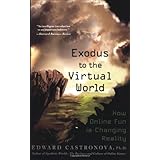
Average Reviews:

(More customer reviews)Are you looking to buy Exodus to the Virtual World: How Online Fun Is Changing Reality? Here is the right place to find the great deals. we can offer discounts of up to 90% on Exodus to the Virtual World: How Online Fun Is Changing Reality. Check out the link below:
>> Click Here to See Compare Prices and Get the Best Offers
Exodus to the Virtual World: How Online Fun Is Changing Reality ReviewI read and thoroughly enjoyed Castronova's first book on the subject: Synthetic Worlds. And, as in SW, Castronova is at is strongest in Exodus when he explains the "realness" of virtual worlds. The main thesis of Exodus is that because synthetic worlds are more fun, people will increasingly choose to spend time in them over the real world, and that, eventually, the real world must remodel itself, taking cues from virtual worlds; eventually the real world must become more fun. Exodus, though it has a few interesting new contributions, is terribly repetitive book that takes way too long getting to the substantial points. When it finally does, it is shallow in its descriptions and analyses of how, exactly, the exodus to synthetic worlds is going to radically affect the real world.The biggest flaw (among the several I found in the book) is Castronova's thesis itself - that the real world will eventually have to model itself on synthetic worlds. The flaw is evident in his use of "migration" as the metaphor for what's going on with synthetic worlds. He explains that a family migrates from Old Country to New Country, and then tells its friends back in Old how great New is. Eventually, after hearing how great New is over and again, those that stayed put in Old put pressure on their government to change the country, to make it more like New. Castronova provides no historical examples of this, and I don't know my history well enough to know if this is how it has happened in the past, but the flaw in the metaphor is, and Castronova admits this himself, that the synthetic migration isn't physical, and therefore not permanent. It's super-easy to switch from real to synthetic, or among various synthetic worlds. This undermines not just his metaphor, but his entire argument...
A better metaphor, one that incorporates the ease of movement between places/activities, would be engagement in different activities, like sports: I play baseball when I want to hit home runs; I play football when I want to score touchdowns; I don't complain that I can't hit a home run in football. Or even more broadly: I go to the gym to work out; I go to the library to study. I don't complain that I can't run on a treadmill in the library. Why wouldn't this be the result of synthetic worlds? I hop into WoW to partake of the "good vs. evil" shared lore. I hop into SL to sell virtual real estate. I hop into the real world to go for a run, eat lunch, take a nap, kiss my spouse. Why should I expect to be able to do any of these things in the other worlds? Once it's established that the synthetic worlds provide fun, and that the real world does not, why/how does it follow that the real world must aspire to be more fun, like synthetic worlds? Why would I demand that the real world also be fun?
Castronova's argument that people will go where their utility is highest points to the same problem in his argument. He thinks synthetic worlds provide the highest utility, so off people go. But it's not as simple as "the world with the highest aggregate utility wins." There are different goods to be achieved in different worlds, so people will always come back to the real world for the goods that only it can provide (Castronova raises the issue of childbirth/rearing in a different context, but I think it's an adequate example of what I'm talking about here). Now, maybe some day in the future it really will be possible to hook up electrodes and "virtually" experience things we once thought we could only experience in the real world: eating a cheeseburger, having sex with our partner, giving birth to a child. But I think we are far from that point and can still easily say that there are just some things that we can only do in the real world. It seems more likely to me that we'll end up in a future where we go to synthetic worlds for fun, but still come back to the real world for other activities, even if they aren't fun.
Exodus to the Virtual World: How Online Fun Is Changing Reality OverviewVirtual worlds have exploded out of online game culture and now capture the attention of millions of ordinary people: husbands, wives, fathers, mothers, workers, retirees. Devoting dozens of hours each week to massively multiplayer virtual reality environments (like World of Warcraft and Second Life), these millions are the start of an exodus into the refuge of fantasy, where they experience life under a new social, political, and economic order built around fun. Given the choice between a fantasy world and the real world, how many of us would choose reality? Exodus to the Virtual World explains the growing migration into virtual reality, and how it will change the way we live--both in fantasy worlds and in the real one.
Want to learn more information about Exodus to the Virtual World: How Online Fun Is Changing Reality?
>> Click Here to See All Customer Reviews & Ratings Now
0 comments:
Post a Comment